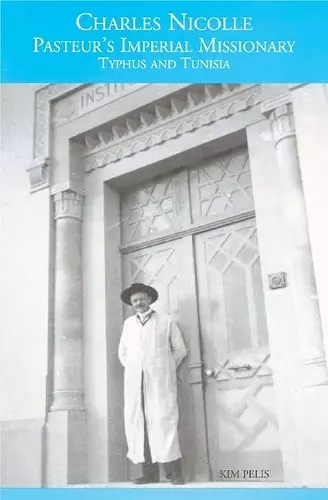Charles Nicolle, Pasteur's Imperial Missionary
Typhus and Tunisia
Format:Hardback
Publisher:Boydell & Brewer Ltd
Published:20th Apr '06
Currently unavailable, and unfortunately no date known when it will be back

Kim Pelis uses a wide range of French and Tunisian archival materials and a close reading of Nobel Prize-winning bacteriologist Charles Nicolle's scientific papers and philosophical treatises to explore the relationship of scienceand medicine to society and culture in the first third of the twentieth century. This book examines the biomedical research of Nobel Prize-winning bacteriologist Charles Nicolle during his tenure as director of the Pasteur Institute of Tunis. Using typhus as its lens, it demonstrates how the complexities of early twentieth century bacteriology, French imperial ideology, the "Pastorian mission," and conditions in colonial Tunisia blended to inform the triumphs and disappointments of Nicolle's fascinating career. It illuminates how thesediverse elements shaped Nicolle's personal identity, the identity of his institute, and his innovative conception of the "birth, life, and death" -- or, the emergence and eradication -- of infectious disease. Kim Pelis blends exhaustive archival research with a close reading of Nicolle's written work -- scientific papers, philosophical treatises, and literary contributions -- to explore the complex relations between biomedical ideas and socioculturalcontext. The result is a study that will be of interest not only to students of French history, colonial medicine, and the history of the biomedical sciences but also to anyone seeking to understand how individuals have attemptedto deal creatively with complex times and ambiguous knowledge. Kim Pelis, a medical historian by training, is a writer for the director of the National Institutes of Health.
Kim Pelis has written a magesterial biography of Charles Nicolle, the Nobel prize-winning microbiologist who demonstrated the louse-borne transmission of one of humankind's most dreaded scourges: typhus fever. But this beautifully written book covers so much more than Nicolle's exemplary scientific life. Indeed, it is a superb and scholarly exploration of late nineteenth and early twentieth century medicine, colonialism, international public health, and the social and cultural history of disease. -- -- Howard Markel, M.D., Ph.D., George E. Wantz Professor of the History of Medicine, University of Michigan, author of When Germs Travel
Charles Nicolle was one of the most complex and creative of Pasteur's disciples. His combination as scientist, clinician, administrator, novelist, philosopher, and tortured individual makes him a fascinating man. Kim Pelis has done justice to all facets of Nicolle's life and work. This is a gem of a book. -- -- W. F. Bynum, M.D, Ph.D, FRCP, Professor Emeritus of History of Medicine, University College London
There was no shortage of competition in the hunt for the cause of typhus, and Nicolle's claim to have discovered the louse as the agent of transmission did not go uncontested. Few important discoveries do. Taking us through the socio-scientific history of typhus, Pelis adroitly details how Nicolle and his close collaborator, Ernest Conseil [Director of public health in Tunis], arrived at their discovery. H-FRANCE, January 2007 * H-FRANCE, January 2007 *
ISBN: 9781580461979
Dimensions: unknown
Weight: 840g
418 pages